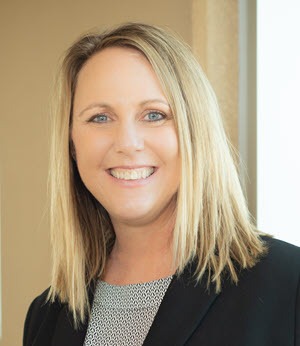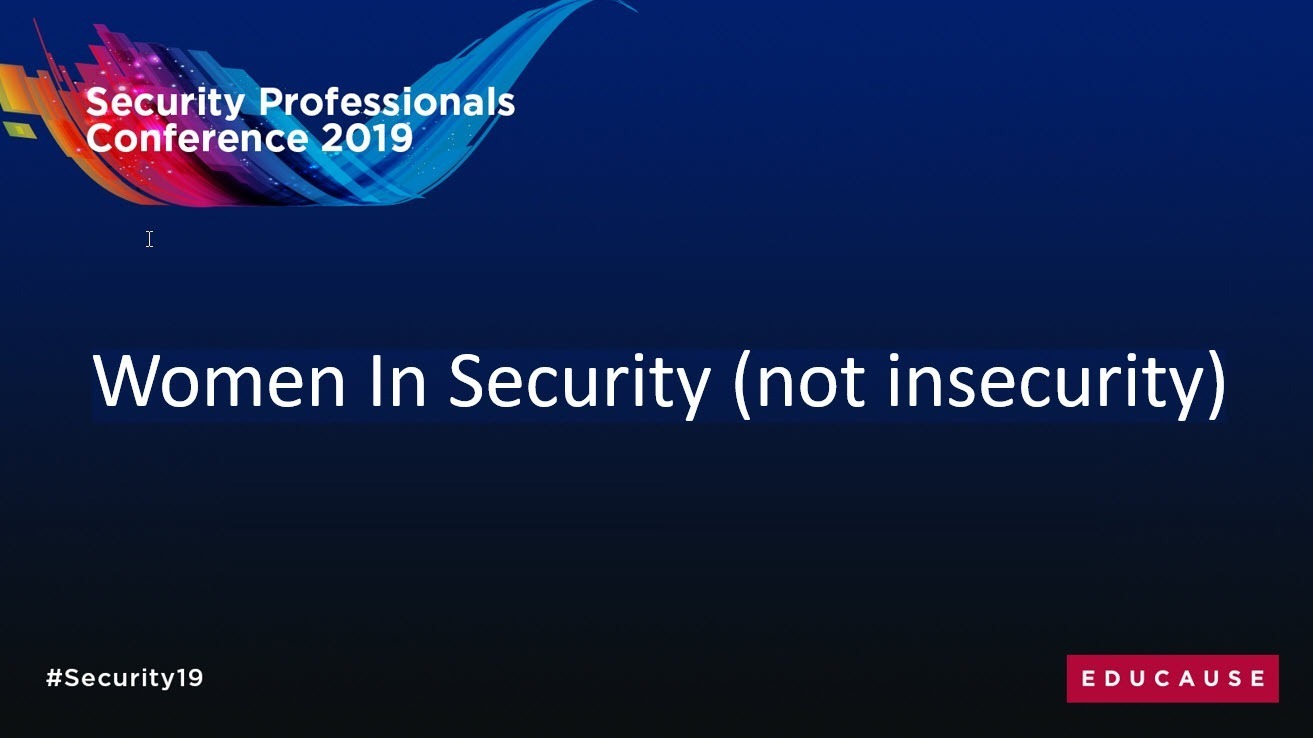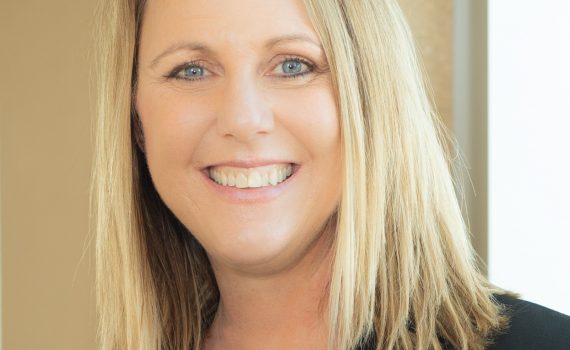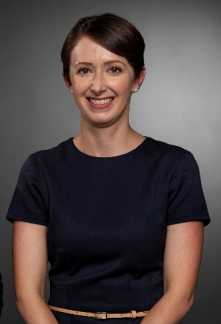
Episode 030: Andrea Childress–Women in IT and Information Security Leadership
Category:EDUCAUSE,Higher Education,Information Security,introversion,Introverted Leadership,Leadchange,Leadership,PodcastPodcast: Play in new window | Download
Subscribe: Spotify | Amazon Music | iHeartRadio | Podchaser | TuneIn | Deezer | RSS
Episode 030 Show Notes: Andrea Childress
Introduction
Andrea Childress and Ben Woelk discuss women in IT and Information Security leadership in Higher Education, her Women in Security panel presentation at the EDUCAUSE Security Professionals Conference, and strategies for overcoming the leadership gender gap. Note: Andrea is now UNK Chief Information Officer and University of Nebraska Assistant Vice President for Information Technology Services .

Key concepts
- The percentage of women in IT is around 14%; even lower in leadership roles
- Mentoring is a key success factor
- Men and women may have unconscious biases around the appropriate roles of women in the workplace
- Diverse teams achieve superior results
- There are parallels between the importance of women and introverts in understanding and identifying their strengths
- Sharing leadership stories and being role models are key to helping address gender diversity
- Leaders (male and female) can advocate for diversity, equity, and inclusion
Quotable
In design thinking, outcomes are going to be very much influenced by the people who are doing the thinking around the design and the priorities are going to reflect the people who are in the room. @benwoelk
When hiring someone, it’s natural for you to want to relate to someone who looks like you, but you have to realize that you really need someone with whatever skills for gaps that you might have.@achildressa
If you have a room full of white men coming up with an application–building an application, it’s going to be very different than if you have a room with ethnic diversity and gender diversity. It will look different. It will be different and it will actually be better. @achildressa
I think people–every single one of us–has to be intentional about diversity, equity, and inclusion, and making sure people feel welcome regardless of where you are or what team they’re on, and that’s–to me that’s being a nice person.@achildressa
Women role models in IT and information security leadership can help diversity by increasing awareness of career opportunities available.
Getting diverse candidates in the door in IT and Cybersecurity isn’t enough. They must be made to feel welcome.
But one of the ways to change that narrative is to say, “Girls are technical, too. Girls can be technical, too. And there’s a lot of us out there that that have been or can be.” And so it’s just realizing that it is a stereotype and helping people understand that diversity means bringing in differences–people that are different than you–so that you can come up with a better solution.
Resources or Products Mentioned in this Episode
- University of Nebraska-Kearney
- Rochester Institute of Technology
- EDUCAUSE
- EDUCAUSE Security Professionals Conference
- Women Advance IT Leadership Conference
- Sheryl Sandberg, Lean In: Women, Work, and the Will to Lead
- Katey Kay and Claire Shipman, The Confidence Code: The Science and Art of Self-Assurance—What Women Should Know
- HBR Women at Work podcast
- Coaching for Leaders podcast
- CodeGirl movie
Links
- Episode 029: Andrea Childress–Building Social Skills and Networking
- Episode 011: Janine Rowe–Introvert Role Models
- Follow Hope for the Introvert on Twitter
- Like my page on Facebook
- Support me on Patreon
- Get swag for Hope for the Introvert and Introverted Leadership at Zazzle
Transcript
Ben: Joining us today is Andrea Childress. Andrea is the Executive Director of Cybersecurity, Governance, Risk, and Compliance for the University of Nebraska. The GRC team provides resources and thought leadership around cybersecurity program management policy, risk assessment, compliance awareness, incident response, privacy and legal requirements. Andrea has a background in application development before moving into management and cybersecurity-focused roles. She has presented at the University of Nebraska Women Advance IT Leadership conference and the EDUCAUSE Security Professionals Conference. Andrea has a Bachelor’s degree in Business Administration Management Information Systems and an MBA from the University of Nebraska at Kearney. You can contact Andrea at achildress@nebraska.edu. I encourage our listeners to visit HopefortheIntrovert.com where you’ll find complete show notes including a transcript of today’s conversations.
Ben: Welcome back. Andrea. I’m looking forward to our conversation today. One of the reasons I asked you to be on the podcast was that I attended a panel that you were part of at the 2019 EDUCAUSE Security Professionals Conference on women in leadership. And I know for our listeners who are part of more technical organizations, information technology and information security, it’s certainly not any 50/50 mix of men and women in those workplaces. So I thought it would be informative for all of us to talk about the issues. There’s a reason that you all had that panel at the conference. Why did you have the panel and what specific issues are you trying to address? What is the state of women in information technology, leadership or information security leadership?
Andrea: Yes. Ben, thanks for having me talk about this. So first of all, why did we do that panel? Well, I have to give credit to my coworker Cheryl O’Dell. It was her idea and we wanted to do it at the University of Nebraska. Every fall has a conference called Women Advance IT. And so it’s a pet project of our CIO that diversity, equity and inclusion are important to him. And so this is something that he did in order to change how the state of the world is in terms of IT, at least at the university. So that conference has been going on for four years as of last fall. And my coworker wanted to do this panel. I agreed to do it with her and I recruited another person and then she recruited another person. So we had this four person panel and the four of us would get on Zoom and talk about, “Okay, what questions do we want to ask ourselves?”
Andrea: What do we want to share, what’s going to make this interesting? So we came up with each person just told their story of how they became–basically their leadership journey and how they got to work in security. And then we talked about if or how being a woman had affected their career, right? If there had been any problems over the years or if there were any issues. People shared their stories about things that they had encountered coming up in the technology world as a woman. And then we would just open it up to the audience, and we got a lot of good questions. And I think the thing that stuck out to me was that women were–who would come up to us after the panel and talk about, “Oh my gosh! I’m so glad to hear that I’m not the only one that these kinds of things happened to,” or, “Boy! Security sounds really fun.”
Andrea: “I want to know more. I thought you had to be super technical to work in security and you guys are showing me that there’s room for all kinds of people and all kinds of jobs in that area, and it’s super exciting and obviously there’s a lot of opportunity in security because there’s way more problems than there are people to solve them in security today.” To answer your question about what is the state. I think it’s like 14% of people in security are women and leadership is even a smaller number. It’s probably more like 5%. I should look that up–I don’t have it on the tip of my tongue. But it’s pretty sad and I have verified that over the years. When I go to a bigger group meeting, I look around the room and I count, and it’s usually one woman for every eight men, which I don’t know if that percentage works out, but it’s like that everywhere you go.
Andrea: It was my coworker’s idea and so we did the panel and it was pretty successful and we felt really great to be able to speak and to hear positive feedback about it. And so then we decided to repeat it just last month, or I guess I was in May at the EDUCAUSE Security Professionals Conference. And the same thing, we had a lot of great feedback. People thanked us for sharing that personal information because they could identify and they could relate, obviously. And we were also pretty constructive, “Here’s ways that we could try to change this.” And the biggest one is awareness, because a lot of it is so ingrained in people that–men and women–that they don’t even realize it. Then when you point out the things that are issues, “Oh, okay. I’m going to try to make sure I don’t do that anymore.” And it’s that unconscious bias term that you’ve probably heard about before. So that’s how I got around to working in this area and the current state.
Ben: It’s interesting because both of us have gone to that same conference for a number of years. The conference has grown larger. I’m not sure the percentages have changed at all in that, I mean we were up over 800 people, I think this last year.
Andrea: Yeah, I think we were over 900.
Ben: I don’t know that there were a hundred women there or 120. A good number of them are clustered around awareness and training, which is what I do, so I tend to meet more of them probably. But there was also many people that I talked to. They didn’t feel like they belonged. They felt like they were around all of these security geeks who are all talking in this very jargon-laced language, not even realizing it at this point. I do think it’s a mainly unconscious or subconscious bias at this point, but you hear about it with programmers and things like that. Just that the workplaces themselves are just not friendly essentially, or that they’re even inappropriate with some of the language or some of the conversation that goes on.
Ben: That’s some of the challenges. What strategies? You mentioned awareness as part of the strategy on how to address this issue. Could you expand on that a little bit more and what do you think would make the biggest difference? And this is not an easy problem or an easy solution to confront or even figure out what to do with. Because in the 2018 conference, there was a breakout session around this [subject] watching a coding movie (CodeGirl). I don’t remember the name of it, but I will post that on the podcast once I figured out what it really is. But again, you look at your percentage of attendees and there’s some men at the thing. It’s almost–it’s primarily women and with the Women in Computing Leadership panel that you were a part of, for the men who attended, to me it was all of the usual suspects. It was the people I would expect to be there because they’ve shown interest before and they understand the issue. But I don’t know how many new people step into it, or, “I’m not going to go to that. That’s a soft topic. I’m going to go to the technical topics because obviously everything’s going to be solved by technology,” which obviously is not the case. How do you see raising awareness and any specific strategies around that?
Andrea: Well, you’re right, Ben. It is difficult. It’s not an easy thing to change. But when I said before how one of our people in the audience came up and said, “Geez, I thought all the jobs were technical.” And you said yourself, a lot of the people in security and awareness and training are females because there’s that stereotype about females being teachers and boys being the techie dudes in black sweat shirts and chugging Mountain Dew, right? That’s the stereotype. But one of the ways to change that narrative is to say, “Girls are technical, too. Girls can be technical, too. And there’s a lot of us out there that that have been or can be.” And so it’s just realizing that it is a stereotype and helping people understand that diversity means bringing in differences–people that are different than you–so that you can come up with a better solution.
[bctt tweet=”Change the narrative! Girls are technical, too. Girls can be technical, too. And there’s a lot of us out there that that have been or can be. Girls not being technical is a stereotype and helping people understand that diversity means bringing in differences–people that are different than you–so that you can come up with a better solution. @achildressa” username=”hopeintrovert”]
Andrea: If you have a room full of white men coming up with an application–building an application, it’s going to be very different than if you have a room with ethnic diversity and gender diversity. It will look different. It will be different and it will actually be better. And that’s been proven in studies. Right? I’m not, making that up. But I think a lot of it is that awareness. And so you have to–people have to learn that you’re in charge of hiring someone–it’s natural for you to want to relate to someone who looks like you, but you have to realize that you really need someone with whatever skills for gaps that you might have.
[bctt tweet=”When hiring someone, it’s natural for you to want to relate to someone who looks like you, but you have to realize that you really need someone with whatever skills for gaps that you might have. @achildressa” username=”hopeintrovert”]
[bctt tweet=”If you have a room full of white men building an application, it’s going to be very different than if you have a room with ethnic diversity and gender diversity. It will look different. It will be different and it will actually be better. @achildressa” username=”hopeintrovert”]
Ben: Right. Another place that some people are finally starting to see these issues is design thinking. I know because there have been articles around it in a couple of different areas. One is around design thinking where your outcomes are going to be very much influenced by the people who are doing the thinking around the design and the priorities are going to reflect the people who are in the room. And again, if it’s all, as you mentioned, if it’s a large group of white males who are doing the design thinking and they’re all a certain Western culture, “Well surprise, surprise.” Their outcome is going to be impacted by that as well.
[bctt tweet=”In design thinking outcomes are going to be very much influenced by the people who are doing the thinking around the design and the priorities are going to reflect the people who are in the room. @benwoelk” username=”hopeintrovert”]
Ben: The other place I’m starting to see the literature around this has to do with artificial intelligence and building programming around that, and all of the AI stuff–which I’m not expert in. But again, you have many white programmers, white male programmers who are working on that. And then it’s, “Well, what is the AI going to reflect?” It’s going to reflect their subconscious or conscious biases. So it’s a problem. It’s not an easily solvable problem. One of the things I’ve seen. I worked at the Rochester Institute of Technology and I typically adjunct teach an Intro to Computing Security class and we have a large program. There are around 250 students who take these intro classes every year. It’s rare that I would ever have more than three female students out of 30 in the class, and not unusual if I have none whatsoever. And that makes me wonder where the problem really needs to be addressed.
Ben: I’m thinking it needs to be addressed back at the high school level or maybe with career counselors or guidance counselors then, so they even understand that there are these opportunities–that there are these career paths and they are not sex-determined career paths. But I’m just trying to think in terms of what do we do at RIT? If we have co-op opportunities in our office, we try to make sure that we have female candidates, but we don’t have many out of the Computing Security department at all. I’m much more successful, again on the communication side, in terms of being able to find a good solid female co-op student who is strong at communication, which is another one of those stereotypes. But I also recognize how poorly most of my male IT students communicate. [Andrea laughing] So in that one, I’m trying to get the best person in that I possibly can. But it does make me wonder where this really needs to be addressed, and whether it’s entrance requirements or whether it’s even awareness that there’s that field or that field is open. I’m not sure. I think it needs to start earlier. I don’t know how to do that, but I think it needs to start earlier, and probably thinking and brainstorming, I can think of ways to do it where you would go into a classroom as an IT manager or security manager and then you’re a role model. So part of it I think is really celebrating the role models and making sure that people are aware of them.
[bctt tweet=”Women role models in IT and information security leadership can help diversity by increasing awareness of career opportunities available.” username=”hopeintrovert”]
Andrea: Yeah, that’s funny, because I’m speaking in a couple of weeks at–I’m just looking at–it’s called the Cyber Gen conference in Omaha and it’s for–I think–middle school-aged girls. And so I’m going to be sharing my leadership journey there as well. And I’m pretty excited about that. I haven’t spoken to that demographic before, so that’ll, that should be fun. I hope. [Laughing] Or maybe even more difficult, I don’t know. But to go back to your question, You’re right. I’ve heard and read a lot that the pipeline is the problem, for females as they grow up and what they are exposed to.
[bctt tweet=”Getting diverse candidates in the door in IT and Cybersecurity isn’t enough. They must be made to feel welcome.” username=”hopeintrovert”]
Ben: Well, to be fair, it’s broader than the pipeline because it’s also going to be the the professors and instructors and what biases they have and whether women feel welcome in those classrooms or not too.
Andrea: That’s true. And yeah, that is what I was going to say, is that it’s not just how early you get to people. It has to be done at all levels, right? It has to be done all throughout your grades, your schooling, and your career. I think I shared at the panel in May, that I had heard the Microsoft CEO speak about a month ago. He was here in Nebraska at the University of Nebraska–Lincoln’s 150th celebration. And he shared his story, or he shared a thought about how every year at Microsoft, the class that they hire, the group of people that they hire is more and more diverse every year, but getting them in the door is not enough. You have to then make them feel welcome, and you already said it that way, Ben.
Andrea: And that’s exactly right. So if you think about a security team planning an outing where they’re going to go see the new Star Wars movie, and I’m not really interested in that, so I’m not going to go. I’m not gonna go just to be with my team if it’s not something I really want to do. I wonder what my team would say if I wanted them to go see, Bridget Jones Diary with me or something like that. How many men would come. It’s just things like that. And I just think it’s like the last episode where we talked about being intentional about networking. I think people–every single one of us–has to be intentional about diversity, equity, and inclusion, and making sure people feel welcome regardless of where you are or what team they’re on, and that’s–to me that’s being a nice person.
[bctt tweet=”We have to be intentional about diversity, equity, and inclusion, and making sure people feel welcome regardless of where you are or what team they’re on. That’s being a nice person. @achildressa” username=”hopeintrovert”]
Ben: Well, something else you referenced the last time we chatted was mentoring, the importance of mentoring. And I think that’s a big piece of this too. And I think men being willing to mentor women and without having harassment problems mixed in with everything else, I think is a big part of it too. I think there may be mentoring is not the right way to work on it, maybe it’s advocates who are supportive of increasing women’s role in IT. Leadership and mentoring I think is a piece of that. But I think the advocate piece is important as well.
Andrea: Yup. I think you’re absolutely right. And you know, one of the things I’ve learned in doing this panel was just people hearing us stand up there and talk just gave them, “Oh my gosh. I feel so much more comfortable about talking about this myself.” And myself as a women–and probably also being an introvert–one of the things that I’ve struggled with is just having confidence, self confidence, being assertive and speaking up in meetings and those kinds of things. And I’ve had to do the same thing in terms of networking where I just make myself do it, practice and practice and practice. And eventually when I fail I realize that I can recover from that. And it’s not a big deal. If you’re not failing, you’re not trying. Right? You’ve heard that before. So, confidence is a super important tool in life. You have to take the risk to get a reward. And if you’re not taking risks, you’re kind of just warming the bench in life. And you’ll have to forgive a sports analogy where we’re talking about women. [Laughing]
Ben: You’re at the University of Nebraska, you’re going to have sports analogies. I went to the University of Florida. There will be sports analogies.
Ben: So any resources that you would recommend maybe they’re books, maybe there are other types of resources that you would recommend for women who want to be or who already are leaders in different information technology or different technical types of fields?
Andrea: Yeah. well, I already mentioned the Women Advance IT conference here at the University of Nebraska this year. So that’s a really great conference now. And there are other ones at other Higher Ed institutions, if that’s your industry that you’re in. And I’m sure there are in all of the industries now. I mean, it’s becoming more and more popular, which is fantastic. In terms of books, everyone’s heard of Sheryl Sandberg’s Lean In and that was probably the first book that I read at some point where I said, “Yeah. Yeah. You know, I identify with this.” And so I of course turned around and bought the book for my two female nieces, and I’m pretty sure they haven’t read it, but they might need it someday. And then a couple of years ago, I learned about a book called the Confidence Code, and I read that book and that for me–was something that just, “Oh, this is normal. The way I feel is normal.” And it’s actually probably more neurological or it’s not just the fact that I’m shy or the fact that I’m insecure. Women are less likely to be assertive than men. And that’s just a fact. So it just helped me realize, “Oh, okay. It’s just a thing, right? It’s just something that I just need to be aware of and I can work on it.” There’s lots of ways to work on that. And there’s lots of podcasts–I’m trying to–I can’t think of one top of my head, but I know that there are some out there. I’ll have come back to those. [laughing] We’ll put them in the show notes.
Ben: But it’s interesting. I think the sharing-the-story part is really important and mainly because–or one of the primary reasons is because–people don’t understand they’re normal. And that’s what I found once I started speaking on introverted leadership as well. I was stunned by the reaction, and how many people embraced it and what a difference it made for them for someone to stand up–even as a white male–someone to stand up as an introvert and a leader and talk about my journey. And that it’s, it’s just incredibly transformative. It’s like the first time you talk to someone who’s read Susan Cain’s Quiet book or something like that. And how different they feel after understanding that things they have thought to be a handicap or something that they believe has held them back, and they understand that, “No, that’s a normal thing.” And also there are strengths and even understanding what those strengths are, I’ve found has made a big difference.
Andrea: Yeah, that’s a great, that’s sort of a great analogy–or it’s not an analogy–but a good parallel in terms of being an introvert or a woman in technology. So, do you think that introvert/extrovert is about 50/50, is that the ratio?
Ben: I think it depends on what you read. And I’m really, I don’t know, it’s not a low number. It’s, you know, 45%, 50%. I don’t know how many people self identify either way. And I think there’s a lot of confusion because there are many people who will equate how shy someone is or if they’re afraid of public speaking and assume that that’s an introverted trait. But that can be either, especially the public speaking part of it. I have plenty of extroverted friends who are terrified of the idea of standing in front of people and talking.
Ben: I do think that what we are seeing is that most leadership is extroverted or are extroverts. And I think a lot of that is coming out of the business schools and the role models that we’re given as leaders and Western culture in general. I don’t believe this transfers across to non-Western cultures in the same way at all. In the few conversations I’ve had with people and what study I’ve done, there’s just very different perspectives on how you get things done and the U.S. and America is just not, we’re not very good at–I think we’re pretty parochial in terms of assuming that, “Well this is the way you do things. Of course it’s the way you do things. It’s the way we do things here.” And I think the lack of travel for people sometimes, and even enmeshed, especially not being enmeshed with other cultures, I think you get different–I think you would get a much broader attitude towards who a leader is, what a leader is, what makes sense in the workplace when you get that exposure.
Andrea: Yeah. That’s a really good insight. Well, I’m not surprised that you’ve had people thank you for doing this podcast because I do think it is valuable and I love to hear the stories myself and everyone’s perspectives. And yeah, so I was asking if it’s 50/50 for sure. I was thinking it probably, I think that what I’ve read is that it is around that ratio, but in the technology industry there’s a lot more introversion than extroversion I think. Yeah. And so it’s a–I don’t know that I’d say it’s a problem, but it’s prevalent in technology, right? We do need to be intentional about doing that and making sure that we’re helping ourselves.
Ben: Yeah. Well I do think it’s a very good thing in terms of a target audience. But yeah, there’s a lot of work that can be done there. And a lot of, enlightenment is one word, which I don’t really like, but a lot of self knowledge and then probably actualization once you realize that, “Oh .yeah. I’m an introvert and I do have strengths and if I want to be a leader, I can be a leader and I can be an effective leader.
Ben: So this has been a great conversation. I’ve been looking forward to this for a while. It’s been fun. So throwing a different question at you to wrap up here, which I’ve started doing to my guests. What is one thing about you that people would be surprised to learn?
Andrea: Oh, Geez. Yeah. Yeah. Like thanks for that sideball–curve ball. Well, as an introvert, one of the crazy things about me is a few years ago, and I don’t do this anymore, but I used to be a Zumba teacher. I went through my first Zumba class in 2012 or something, and I loved it and I’ve always loved to dance. And so I went to my very first class, I said, “Oh my gosh!” I wanted to be the one in the front of that room, picking up the music and showing how to do the moves or whatever. And so I went to the training class and I practiced and I became a teacher, and I got a part-time job where I was teaching it at our YMCA. And when you sit down and you think about that, when you’re a Zumba teacher, you have to exaggerate your movements to get the excitement from your students so that you’re, you’re supposed to be making them have so much fun that they forget they’re exercising, right? And so you have to really clown it up. And as an introvert, I realized how hard that was for me to do at first. But it was so much fun. And when you know, you see the smiles on people’s faces, it was super rewarding and worth it. And it was also very good exercise. So that was–I can’t believe I was ever a Zumba teacher! I had to give it up for work, and because I got hurt. [laughing] It was fun though.
Ben: I would have a hard time maintaining a smile or big smile in front of everyone. That’s great! Andrea, I want to thank you again for being a guest on the podcast. It’s been a great conversation and who knows down the line maybe we’ll find some new things to talk about and record another session.
Andrea: Thanks so much, Ben. It’s been fantastic!
Extras
Women in Security (Not Insecurity) panel at EDUCAUSE Security Professionals Conference 2019















